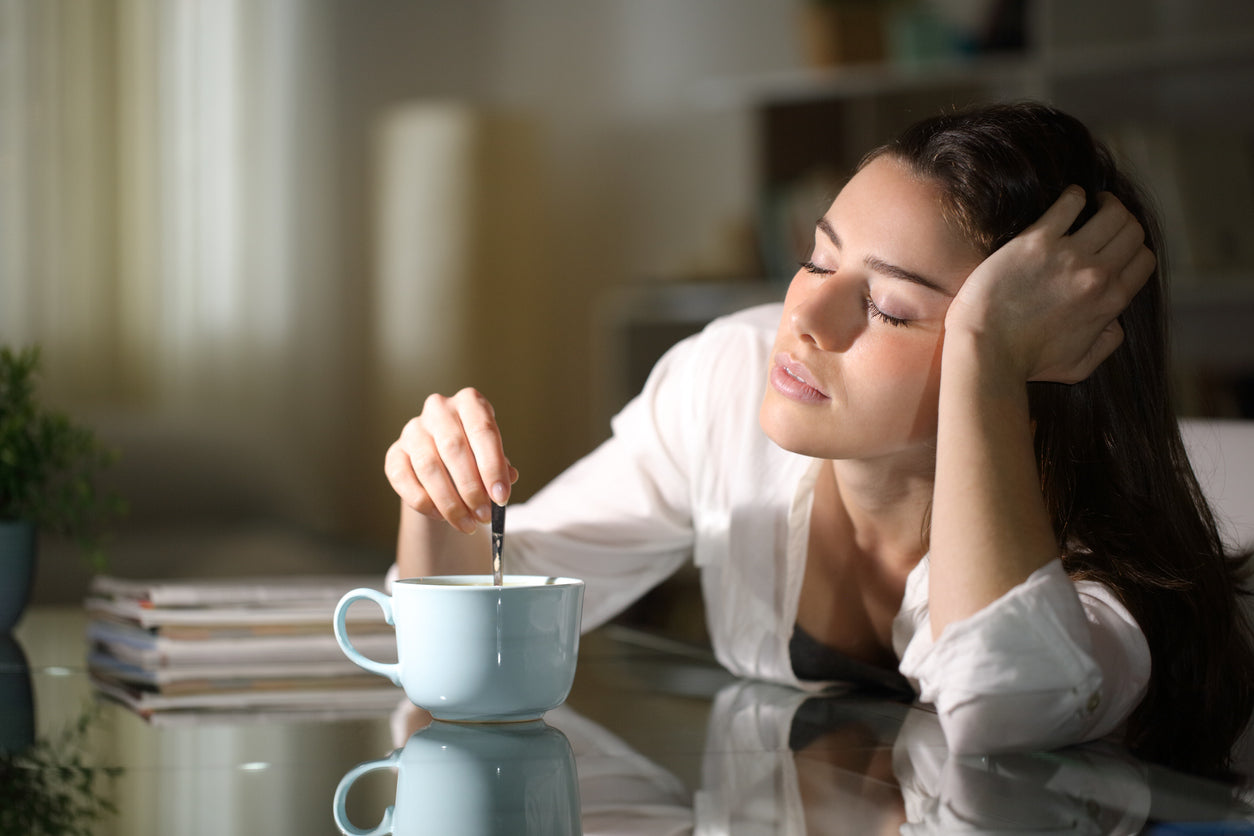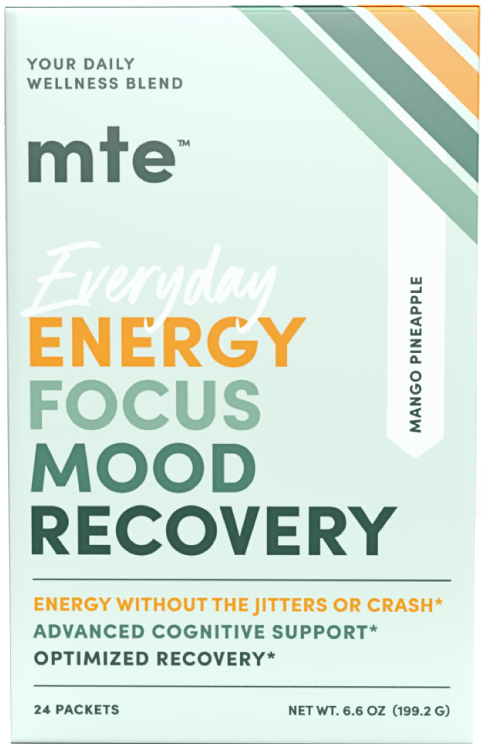
Need for Sleep: Can Drinking Caffeine Replace Sleep?
When you’re in the middle of a hectic week, barely catching a wink of sleep, it’s only natural to turn to caffeine for that much-needed pick-me-up. After all, most of us rely on coffee or energy drinks to keep our eyelids from closing down.
But while caffeine can temporarily save you from the brink of yawning, it’s a bit like slapping a bandaid on a leaking dam. Even if it does something, it’s only temporary, and when it fails, the fatigue floodgates open.
Overusing caffeine can leave you feeling more drained than ever while still being unable to get a single good night’s rest. You sleep less – you consume more caffeine. You feel worse – you do it again.
Horrible. Unenjoyable. And according to that old adage: insane.
You can’t fix a dam without some seriously strong building materials, which caffeine and sugar are not. Instead, you need a wellness companion that plugs that leak, patches the area, and scaffolds the whole thing – MTE, a healthy energy drink powder.
This caffeine-free energy enhancer can help you break the cycle of chronic fatigue and caffeine overconsumption. So, let’s see why coffee can’t just replace sleep and how MTE can help.
The Role of Neurochemicals in Sleep Regulation
Caffeine seems like the ultimate pick-me-up, capable of fighting off fatigue and keeping you alert during those long, hectic days. But the truth is, it’s not really eliminating fatigue – it just makes you feel like you don’t need sleep. (Until it doesn’t.)
So, how does it do that?
As you navigate through your day, tackling tasks and challenges, your brain steadily accumulates a molecule that acts as a built-in fatigue indicator. This neurotransmitter signals your brain and body that it’s time to rest. And with each passing hour, this signal gets stronger, culminating in the evening when you start yearning for your cozy bed.
When you go to sleep, your brain begins housekeeping, cleaning up all the leftovers of the fatigue chemical that accumulated throughout the day. Give your body enough time to clean the house, and you’ll wake up feeling well-rested in the morning.
So, where does caffeine cut into this process?
Caffeine and Fatigue Signaling
Caffeine binds to the same receptors in the brain as the go-to-bed chemical but doesn’t activate them in the same way. Instead, caffeine blocks them, preventing that go-to-bed chemical from talking. At all.
Think of these neuron receptors as locks and neurochemicals as keys that unlock them to activate neurons to signal to the brain that it’s time to wind down. The caffeine is like a key that can fit inside a lock but can’t turn it. So, it just jams the lock, blocking it for a few hours.
As a result, those neurons that would typically fire a signal that you’re tired don’t go off, and you feel more alert and energized. But in reality, it is only a temporary illusion. Those chemicals are still there. Watching. Waiting.
Once the caffeine is cleared off, the surge of fatigue signalers binding to now-free receptors overloads your brain, screaming, “We’re tired, we’re tired!” That’s when you experience the much-dreaded caffeine crash.
In addition, caffeine increases energy mobilization in the body by flooding the body with fight-or-flight signalers. Everyone knows that your body produces these in stressful situations to prepare you to fight, flee, or freeze. But, in reality, your body constantly creates a low-grade drip of this chemical to keep you alert and awake.
This is where nootropics vs stimulants become an important distinction. Stimulants like caffeine work by forcing your body into a state of heightened alertness, often at the cost of increased stress and eventual crashes. Nootropics, on the other hand, support cognitive function without overstimulating the nervous system.
Increasing levels of “Let’s go!” chemicals contributes to the energy-boosting effects of caffeine. But that can also lead to certain side effects like heart palpitations, irritability, and jitters.
Caffeine Tolerance & Chronic Fatigue
The initial caffeine buzz dwindles after a few hours as your brain accumulates more waste products. With so much chemical “noise” circulating, it’s hard to mask the intense tiredness, no matter how much coffee you drink.
Your body needs sleep, and nothing can change that. With each dose of caffeine, you’re essentially hitting the snooze button on your body’s clean-up cycle. But as you continue to postpone the inevitable, those ever-present fatigue signalers are building up like a snowball rolling downhill.
Eventually, your brain metabolizes all the caffeine, and then it’s got nothing left to give. It begins to shut down higher-order processes gradually, prioritizing the essential housekeeping tasks it must complete to keep your system running smoothly, which is why you feel dead and dumb after you crash. No matter how much caffeine you’ve consumed, your brain’s demand for rest will eventually overpower it.
In addition, your body builds tolerance to caffeine. Over time, you’ll need more caffeine to achieve the same energy-promoting effects. Unfortunately, that’s not possible because excessive caffeine consumption has its consequences.
The Downfalls of Excessive Caffeine
A cup of joe in the morning or a mid-afternoon healthy energy drink can be your trusty sidekick, but excessive caffeine consumption can lead to its share of nasty changes to your health. As tempting as it is to rely on caffeine to postpone your body’s call for sleep, it’s essential to be aware of the potential dangers like:
- Irregular heartbeat: Too much caffeine can lead to palpitations or an irregular heartbeat, which can strain your heart and increase the risk of cardiovascular events.
- Overwhelming fatigue: Excessive caffeine might temporarily mask fatigue, but it doesn’t eliminate it. As time passes, accumulated fatigue can overpower caffeine’s effects, leaving you exhausted.
- Compromised learning and memory: Adequate sleep is crucial for memory consolidation and cognitive performance. Prolonged sleep deprivation due to excessive caffeine can hinder these mental functions.
- Stress/Overstimulation: High caffeine doses can lead to jitters and feeling overwhelmed, which are not exactly the ideal companions for a healthy, happy life.
- Sleep disturbances: Trying to stay awake when you should be sleeping can lead to an inability to get quality rest at night, creating a vicious cycle.
- Mood swings: Caffeine’s rollercoaster effect on your alertness can contribute to mood swings, like low mood and irritability, making you less pleasant to be around.
Natural Coffee Alternatives: Is There a Better Way to Boost Energy?
If you’re searching for a morning supplement drink to kickstart your day, MTE may be the game-changer you’ve been looking for.
Unlike coffee or traditional energy drinks, this healthy energy drink powder combines a unique blend of nootropics, adaptogens, and superfoods that provide sustained energy without the rollercoaster of highs and lows.
In fact, MTE even contains some nootropics that can help you sleep better.
Here’s how MTE’s carefully selected ingredients make it the perfect coffee alternative:
- Nootropics: MTE includes nootropics such as l-theanine and paraxanthine that promote focused, relaxed concentration. They work in harmony to keep you alert without the jittery sensation that coffee often brings.
- Adaptogens: MTE contains adaptogens like ashwagandha and eleuthero that support stress resilience, promote relaxation, and support cognitive functioning. They help to maintain a calm and focused mind.
- Superfoods: MTE contains superfoods like spirulina and amaranth that contribute to overall well-being. They offer a well-rounded balance, which makes MTE a perfect caffeine-free energy drink powder that supports your health.
MTE & Sleep: Perfect Combination
Caffeine can mask our need for sleep for a little while, but nothing can replace a good night’s rest that comes with actual recovery. And as we’ve seen, that’s not something caffeine can do.
A daily wellness blend like MTE can offer more than just a quick energy boost. With nootropics, adaptogens, and superfoods, this healthy energy drink powder gently supports healthy levels of neurotransmitters associated with mood and motivation, ensuring calm energy and dialed-in focus.
However, even MTE can’t work miracles. You still need quality sleep - nothing is a substitute for that. But, MTE can complement the benefits of healthy lifestyle habits like keeping a consistent sleep schedule and getting regular exercise.
With MTE, you’re not just awake – you’re thriving. Try MTE and discover how this wellness companion can help you improve your everyday life and productivity.



